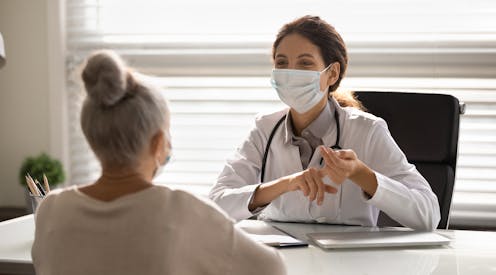
With COVID cases, hospital admissions and deaths resurging, every Australian needs to know what they can do to reduce their risk of becoming seriously unwell.
Last week, Minister for Health and Aged Care Mark Butler advised Australians who are at higher risk of becoming seriously unwell with COVID to consult their GPs and make a plan for what they will do if they are infected.
But what should you ask your GP? And what information can you provide them with to ensure you have a COVID plan in place and can access the right treatment when you need it?
Read more: Australia is heading for its third Omicron wave. Here's what to expect from BA.4 and BA.5
Antivirals for mild cases
Two oral COVID treatments are available on the Pharmaceutical Benefits Scheme for use at home by people who have been diagnosed with mild COVID illness and who are at elevated risk of becoming seriously ill: Lagevrio and Paxlovid.
To reduce the risk of progression to severe disease and hospitalisation, these treatments must be started as soon as possible, within five days of when symptoms start.
Nirmatrelvir plus ritonavir (Paxlovid) is the more effective of these two treatments but it can have complex interactions with many common medicines.
Working out whether a person qualifies for these treatments, whether the treatments are safe for them and giving appropriate advice often takes more than 20 minutes in a consultation with your GP.
You can reduce the stress on yourself and on your GP and their practice by discussing these questions while you are well and before any COVID infection is suspected or detected.

A 6-step plan to stay as well as possible
1. Find a GP
If you don’t yet have a usual GP or general practice, choose one now and ask for an appointment of at least 30 minutes. The purpose of this consultation is for the GP to gain an understanding of your state of health, and so you can make a plan together for what you and the GP will do if you are infected with COVID.
Medicare benefits are payable in these circumstances only for in-person consultations – but you should attend the general practice only if you are well and not a close contact of someone with COVID.
Read more: People attending GPs aren't getting all the preventive health care they need. Here's what could help
2. Check your eligibility
If you already have a usual GP or practice, make an appointment with them and check whether you are eligible for PBS-subsidised oral antiviral treatment. Should you be diagnosed with COVID infection, it is important to be prepared as treatment must start as soon as possible.
The eligibility criteria for subsidised antiviral COVID treatments have recently been expanded. Now people aged 70 years and older can access the treatments, as can people over 50 with two or more risk factors, Aboriginal or Torres Strait Islander people over 30 with two or more risk factors, and people with compromised immunity who are over 18.
If you meet the criteria, or you are not sure whether you are in a higher risk group, ask for an appointment with your GP to check eligibility and to make a plan.
Read more: COVID drugs in Australia: what's available and how to get them
3. Get all the COVID vaccinations you’re due
Have all doses of COVID vaccine recommended for your age and health status, as soon as you are eligible for each dose. The currently recommended numbers of doses are: two doses for children aged 5 to 15 years; three doses for adolescents and adults aged 16 to 29 (additional doses are recommended for children and adolescents with disabilities or chronic conditions); three doses for adults aged 30 to 49 with an optional fourth dose; and four doses for adults over 50.
ATAGI recommends vaccination to prevent serious illness and death from COVID.
Read more: COVID vaccination recommendations evolve over time. Who is due for which dose now?
4. Get your flu vaccine too
Have this year’s influenza vaccine now if you have not already received it. The influenza vaccine is recommended for everybody over six months old and is available from GPs and pharmacies.
The influenza vaccine can be given at the same time as a COVID vaccine. Some GPs and pharmacies charge a consultation or service fee for administering the vaccine.
If you aren’t sure how many doses of COVID vaccine you have had or when you received them, or whether you have had this year’s influenza vaccine, you can check in your My Health Record or you can view your COVID vaccinations though your MyGov account that you have linked to Medicare. Your GP can also check for you during a consultation.
Read more: Which flu shot should I choose? And what are cell-based and 'adjuvanted' vaccines?
5. Mask up
Wear an effective mask (preferably not a cloth one) everywhere you can’t physically distance yourself from other people. This is especially important in indoor crowded places, as well as in places where masks are required such as health and aged care facilities. Continue with hand hygiene too.
Read more: Time to upgrade from cloth and surgical masks to respirators? Your questions answered
6. Check your medicine cabinet
Make a list of the medicines (including supplements and over the counter drugs) that you’re taking and how often you take them.
If you are able to, check online whether you are using any medicines that are known to interact with COVID drugs. Some people prescribed Paxlovid will have to stop or reduce the dose of one or more of their usual medicines while using it. Others might not be able to use Paxlovid safely, in which case one of the other treatment options can be considered.
The online tool can generate and save a report with any known interactions between Paxlovid and your usual medicines. Then you can email or show that list to your GP once you have made an appointment for a consultation. Your GP will also be able to check potential drug interactions for you during your pre-COVID appointment.
Read more: I’m at home with COVID. When do I need to see a doctor? And what treatments are available?
Oliver Frank does not work for, consult, own shares in or receive funding from any company or organisation that would benefit from this article, and has disclosed no relevant affiliations beyond their academic appointment.
This article was originally published on The Conversation. Read the original article.







